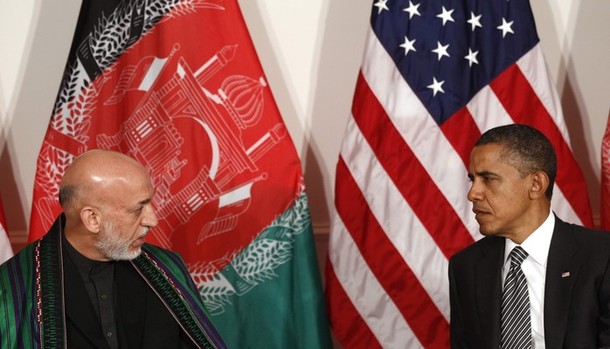
From Robert Burns, AP: The Obama administration says it might leave no troops in Afghanistan after December 2014, an option that defies the Pentagon’s view that thousands of troops may be needed to contain al-Qaida and to strengthen Afghan forces.
“We wouldn’t rule out any option,” including zero troops, Ben Rhodes, a White House deputy national security adviser, said Tuesday.
“The U.S. does not have an inherent objective of ‘X’ number of troops in Afghanistan,” Rhodes said. “We have an objective of making sure there is no safe haven for al-Qaida in Afghanistan and making sure that the Afghan government has a security force that is sufficient to ensure the stability of the Afghan government.”
The U.S. now has 66,000 troops in Afghanistan, down from a peak of about 100,000 as recently as 2010. The U.S. and its NATO allies agreed in November 2010 that they would withdraw all their combat troops by the end of 2014, but they have yet to decide what future missions will be necessary and how many troops they would require. . . .
Panetta has said he foresees a need for a U.S. counterterrorism force in Afghanistan beyond 2014, plus a contingent to train Afghan forces. He is believed to favor an option that would keep about 9,000 troops in the country.
Administration officials in recent days have said they are considering a range of options for a residual U.S. troop presence of as few as 3,000 and as many as 15,000, with the number linked to a specific set of military-related missions like hunting down terrorists.
Asked in a conference call with reporters whether zero was now an option, Rhodes said, “That would be an option we would consider.”
His statement could be interpreted as part of an administration negotiating strategy. On Friday [Afghan President Hamid] Karzai is scheduled to meet Obama at the White House to discuss ways of framing an enduring partnership beyond 2014.
The two are at odds on numerous issues, including a U.S. demand that any American troops who would remain in Afghanistan after the combat mission ends be granted immunity from prosecution under Afghan law. Karzai has resisted, while emphasizing his need for large-scale U.S. support to maintain an effective security force after 2014. . . .
Rhodes said Obama is focused on two main outcomes in Afghanistan: ensuring that the country does not revert to being the al-Qaida haven it was prior to Sept. 11, 2001, and getting the government to the point where it can defend itself.
“That’s what guides us, and that’s what causes us to look for different potential troop numbers — or not having potential troops in the country,” Rhodes said.
He predicted that Obama and Karzai would come to no concrete conclusions on international military missions in Afghanistan beyond 2014, and he said it likely would be months before Obama decides how many U.S. troops — if any — he wants to keep there. (photo: Reuters)
Image: reuters%203%2016%2012%20Karzai%20Obama.jpg
